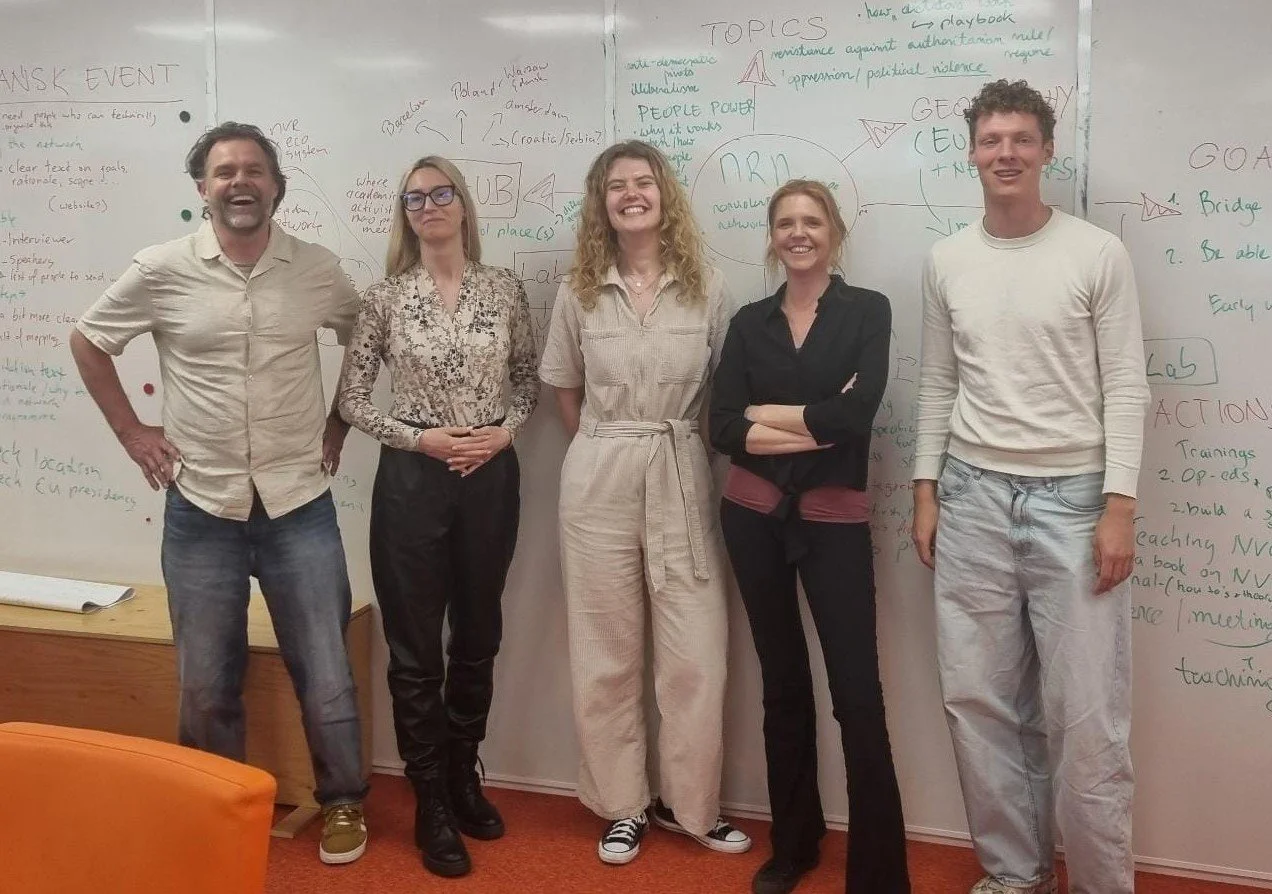Who we are
Katarzyna Anna Przybyła from Collegium Civitas (Poland), Anne de Jong from the University of Amsterdam (The Netherlands), Willemijn Born from the Vrije Universiteit (The Netherlands) and Guido de Graaf Bierbrauwer from peace organization PAX (The Netherlands) are the initiators of this network. With decades of shared experience working on nonviolent resistance, they realized that to be more effective, the different groups - scholars, activists, practitioners and policy makers - need to work together better.
"from left to right - Guido de Graaf Bierbrauwer, Katarzyna Anna Przybyła, Willemijn Born, Anne de Jong and Hielke Hijlkema (Project Assistant)"
Why this network
Authoritarianism is on the rise. Democracy is in decline. This global phenomenon has an immense impact on the freedom, peace and security of millions of people. According to Freedom House, freedom in the world has been in decline for 16 consecutive years. The Global Peace Index reported in 2023 the thirteenth deterioration in peacefulness in the last fifteen years. Civic space and human rights are more and more under pressure, and there is a clear anti-gender backlash. At the same time, military spending is surging and the number of armed conflicts is also rising. This trend is clearly visible in Europe: Russia’s brutal war against Ukraine surpassed the 1000 days and as Freedom House reported in 2024, the 20th consecutive year of declining democratic governance in Eastern Europe.
Simultaneously, activism is also on the rise, fueled by discontent about the manner in which crises, for example with climate, poverty, housing or violence are being handled by governments or international governmental institutions. All over the world, people power is being mobilized to demand change, and to make change happen themselves. Social movements have proven to be essential catalysts for political and societal change. Without movements, we would have no universal suffrage, no labor laws, no democratic, peaceful revolutions in autocratic countries. Evidence shows that nonviolent campaigns are more successful than and lead more often to democratic transitions than violent ones or coups do.
What we do
We created the nonviolent resistance network to do the following:
Address the lack of an academic network, association or society where scholars meet, share research, write articles in a specialized journal, organize conferences, and further develop the nonviolent resistance field. Much of the academic research still comes from the United States, lacking a clear ‘European lens’ when looking to nonviolent resistance on our own continent.
Close the gap between theory and practice. Research findings are not automatically translated into better tools and strategies for activists. And on the other side, the knowledge and experiences of activists and practitioners could be included better into the research of researchers. There is no platform or network or physical space where scholars, practitioners and activists meet, to learn, to reflect, to co-create.
Offer a new, adaptive way of responding to crises and reinforce a movement’s momentum, as current responses are often too little and too late. Experiences with regard to, for example, Georgia, Belarus and Ukraine show that the frontline activists and nonviolent resistance movements did not get the support they needed, at the moment they needed it the most.
Advance the know-how on effectively countering the increasing illiberalism or repression in Europe. The autocratic turn is increasingly studied, but how to turn towards democracy through a bottom-up approach requires further in depth exploration, to be able to face Europe’s most-pressing contemporary challenges.
Posit nonviolent resistance as a genuine alternative to counter contemporary threats. In current European policy discussions on peace and security, the military approach is predominant, despite the fact that most politicians, academics and the military acknowledge that is insufficient to counter modern threats to peace and security.

